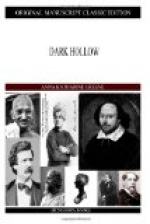It was to answer this question—to face this new view of Oliver and the bearing it had on the relations she had hoped to establish between him and Reuther, that she had waited for the house to be silent and her child asleep. If the defacing marks she had seen meant that the cause of separation between father and son lay in some past fault of Oliver himself, serious enough for such a symbol to be necessary to reconcile the judge to their divided lives, she should know it and know it soon. The night should not pass without that review of the past by which alone she could now judge Oliver Ostrander.
She had spoken of him as noble; she had forced herself to believe him so, and in profession and in many of his actions he had been so, but had she ever been wholly pleased with him? To go back to their first meeting, what impression had he made upon her then? Had it been altogether favourable and such as would be natural in one of his repute? Hardly; but then the shock of her presentation to one who had possibly seen her under other and shameful conditions had been great, and her judgment could scarcely have full play while her whole attention was absorbed in watching for some hint of recognition on his part.
But when this apprehension had vanished; when quite assured that he had failed to see in the widowed Mrs. Averill the wife of the man who had died a felon’s death in Shelby, had her spirits risen and her eyes cleared to his great merits as she had heard them extolled by people of worth and intellectual standing? Alas, no. There had been something in his look—a lack of spontaneity which had not fitted in with her expectations.
And in the months which followed, when as Reuther’s suitor she saw him often and intimately—how had she regarded him then? More leniently of course. In her gratification at prospects so far beyond any she had a right to expect for her child, she had taken less note of this successful man’s defects. Peculiarities of conversation and manner which had seemed to bespeak a soul far from confident in its hopes, resolved themselves into the uneasy moods of a man who had a home he never visited, a father he never saw.
But had she been really justified in this easy view of things? If the break between his father and himself was the result of nothing deeper than a difference of temperament, tastes or even opinions, why should he have shrunk with such morbid distaste from all allusions to that father? Was it natural? She may have looked upon it as being so in the heyday of her hopes and when she had a secret herself to hide, but could she so degrade her judgment now?
And what of his conduct towards Reuther? Had that been all her mother heart could ask of a man of his seemingly high instincts? She had assured his father in her first memorable interview with him that it had been perfectly honourable and above all reproach. And so it had been as far as mere words went. But words are not all; it is the tender look, the manly bearing, the tone which springs from the heart which tells in great crises; and these had all been lacking. Generous as he attempted to show himself, there was nothing in his bearing to match that of Reuther as she took her quiet leave of him and entered upon a fate so much bitterer for her than for him.




